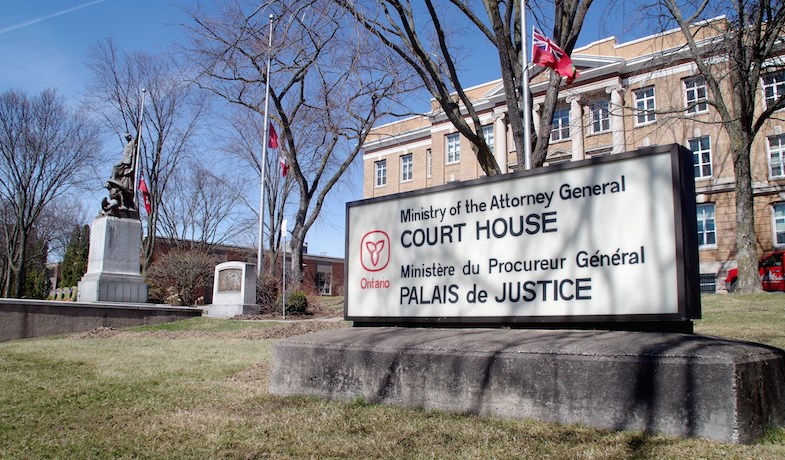For a second time, a Sault Ste. Marie man has walked away from serious drug charges after problems with an RCMP investigation.
Richard Hurley was acquitted Wednesday of cocaine-related offences after a judge found that the Mounties had violated his Charter rights, and ruled the drugs seized during his arrest were inadmissible at his trial.
Ontario Court Justice Romuald Kwolek determined that Hurley was wrongfully arrested on Jan. 8, 2016 because the RCMP lacked reasonable and probable grounds to detain him.
The warrantless arrest violated Hurley's rights not to be arbitrarily detained and was unlawful, he said in a 46-page decision.
Police institutional bias against Hurley elevated a reasonable suspicion of criminal activity to a basis for justifying his arrest, the judge concluded.
As well, he determined that an improper search of Hurley's cellphone violated his right to be secure against unreasonable search and seizure.
When Kwolek said the half a kilogram of cocaine the officers had seized would be excluded from the proceedings, the prosecution indicated it had no other evidence and the judge dismissed the charges.
Hurley, 39, had pleaded not guilty to possession of cocaine for the purpose of trafficking and resisting arrest.
In his decision, Kwolek noted "the exclusion of the evidence of the cocaine will gut the prosecution's case and prevent the hearing of these very serious charges against the accused on its merits."
While this would support the inclusion of this crucial evidence, the courts can't ignore, nor be seen to condone, significant violations of an individual's Charter rights, he said.
Based on the circumstances of the case, the "serious" breaches and relevant case law, admitting the cocaine as evidence would "bring the administration of justice in disrepute," Kwolek concluded.
Hurley was charged in 2008 with possession of about six kilograms of cocaine, but these charges were stayed two years later after it was revealed that a senior RCMP officer had admitted fabricating an internal wiretap memo, that was given to the defence during his preliminary hearing.
Hurley was arrested in 2016 during an RCMP drug investigation, dubbed Project OTamper, that was targeting another man, a personal trainer alleged to be trafficking steroids.
Hurley's trial began in February of this year, with a voir dire — a trial within a trial — to hear the Charter application filed by his lawyer Michael Lacy.
The court heard from five RCMP officers involved in the investigation and a city police technical crime unit officer who examined the cell phone.
Mark Allison, who headed up the project, was a key Crown witness, and ordered Hurley's arrest after he left the residence of the other man who was under surveillance
Lacy argued that Allison's evidence wasn't credible, but Kwolek declined to find that Allison knew he didn't have sufficient grounds to arrest Hurley and did so anyways.
However, he did conclude that Allison did have a bias that affected his subjective analysis of the evidence he had.
There was no evidence presented that Hurley, who had no criminal record, was a "trafficker of drugs or specifically of cocaine," at time of the arrest, the judge said.
Allison testified that he believed at the time that "once a trafficker always a trafficker" and he felt Hurley was involved in the drug trade.
Kwolek said evidence at the voir dire clearly demonstrated there was an investigative bias against Hurley, after the officers observed him meeting with the project's target on Jan.7, in interpreting the evidence that followed it.
"The direction to arrest was made without knowing whether Hurley had anything in his possession and he was ultimately charged only with the item he actually had in his possession on that day."
Because of the circumstances surrounding the earlier RCMP project, Hurley had initiated a lawsuit against the federal police force and some of the officers involved in Project Omax, including one officer who was still with the Sault detachment, but not involved in the recent investigation, the judge said.
"The court accepts that such lawsuit, as well as Hurley's avoidance of any finding of guilt in the earlier criminal proceeding, may have contributed to the institutional bias."
The search of Hurley's phone, which also was seized when he was arrested, illustrated ongoing serious breaches of his privacy interests, Kwolek said.
"It is difficult to describe a more substantial incursion into the private life of an individual than what occurred in this case."
Allison's investigatory mindset, that the "proof is in the pudding" in justifying Hurley's arrest, plus his view that "once a trafficker always a trafficker" seemed to justify to the police a search of the phone that wasn't in accordance with the search warrant or executed in a manner that was limited to a reasonable search, he said.
The warrant was granted to look for evidence relating to the charge, but police searched videos and photos, a significant number of which were of an intimate and highly personal nature, that had no relevance to the investigation, the judge said.
The search did not appear focused on any related evidence, "but appeared to be in the nature of a fishing expedition looking for any other historical evidence of offences."
Kwolek said the improper manner in which cell phone search was executed "had a very significant impact" on Hurley's protected Charter rights.
He noted that apparently no evidence of any relevance was recovered from the phone and no information from it was sought to be tendered as evidence at the voir dire.
